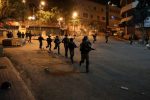At midday on 7 October Israel’s supreme military command ordered all units to prevent the capture of Israeli citizens “at any cost” – even by firing on them.
The military “instructed all its fighting units to perform the Hannibal Directive in practice, although it did so without stating that name explicitly,” Israeli journalists revealed last weekend.
The revelations came in a new investigative article by Ronen Bergman and Yoav Zitun, two journalists with extensive sources inside Israel’s military and intelligence establishment.
They also revealed that “some 70 vehicles” driven by Palestinian fighters returning to Gaza were blown up by Israeli helicopter gunships, drones or tanks.
Many of these vehicles contained Israeli captives.
The journalists wrote that, “it is not clear at this stage how many of the captives were killed due to the operation of this order” to the air force that they should prevent return to Gaza at all costs.
“At least in some of the cases, everyone in the vehicle was killed,” the journalists explain.
The Hebrew piece has not been translated into English by its publisher, Yedioth Ahronoth, a newspaper which translates many of its articles. You can read The Electronic Intifada’s full English version, translated by Dena Shunra, below.
The secretive “Hannibal” doctrine is named after an ancient Carthaginian general who poisoned himself rather than be captured alive by the Roman Empire.
The order aims at stopping Israelis from being taken captive by resistance fighters who could later use them as leverage in prisoner swap deals.
“Overpowered”
The latest revelations confirm The Electronic Intifada’s reporting since 7 October that many – if not most – of the Israeli civilians killed that day were killed by Israel itself, not Palestinian fighters.
Initial claims stated that 1,400 Israelis were killed by Hamas in the Palestinian assault that began on 7 October. But Israel has repeatedly revised this figure downwards, so that it now stands at “over 1,000.”
It was also clear from the outset that hundreds of the dead were in fact Israeli soldiers.
Hamas maintains that they targeted military bases and outposts, and that their aim was to capture rather than kill Israeli civilians, and to kill or capture Israeli soldiers.
Based on interviews with those present, the new article says that top officers at Israel’s underground military headquarters in Tel Aviv on 7 October declared in shock that “the Gaza Division was overpowered.”
One person present that day – referring back to earlier Israeli shocks such as the surprise counterattack by Egypt and Syria in October 1973 – told the journalists that, “We thought that this could never happen again, and this will remain a scar burnt into our flesh forever.”
As well as what they claim was “heroism,” Bergman and Zitun’s investigation reveals what they describe as “a long series of failures, mishaps, and chaos in the army,” including “a command chain that failed almost entirely.”
Palestinian resistance fighters successfully targeted the communications infrastructure, they write, destroying 40 percent of communication sites around the Gaza frontier, including towers and relay antennas.
For hours, therefore, Israel’s top brass were in the dark as to the scale of the assault.
To make up for this, “they turned to television and to social media feeds, primarily to Telegram, to Israeli channels, but primarily to Hamas channels.”
1,000 drone targets inside Israel
In November, The Electronic Intifada reported on Israeli air force footage, as well as interviews in an Israeli article with attack helicopter pilots, showing that they had been ordered to “shoot at everything” moving between Israel’s frontier settlements and Gaza.
That Israeli article stated that “in the first four hours … helicopters and fighter craft attacked about 300 targets, most in Israeli territory.”
Bergman and Zitun’s new article says that by the end of the day, drone squadron 161 alone (which flies Elbit’s Hermes 450 drone) “performed no fewer than 110 attacks on some 1,000 targets, most of which were inside Israel.”
As reported by The Electronic Intifada in English for the first time, Israeli news media last month showed footage of tank operators firing at Israeli homes inside the kibbutzes during the battles with the Palestinian resistance on 7 October.
The Electronic Intifada was also the first to reveal in English, back in October, the testimony of Yasmin Porat, one of only two survivors of an Israeli attack on a home in Kibbutz Be’eri which contained around a dozen captives held by Palestinian fighters.
Porat told Israeli media that the Palestinians had treated them “humanely” but that the Israeli army ended a standoff with the fighters by deliberately tank shelling the whole house, even though captives were still present.
She later elaborated that the casualties of the Israeli attack included 12-year-old Israeli captive Liel Hatsroni. Hatstroni’s photo was later used in propaganda by Israeli officials, wrongly claiming she had been burned alive by Hamas – “because she’s Jewish,” former prime minister Naftali Bennett lied.
Last month The Electronic Intifada also reported on an Israeli air force colonel who admitted that 7 October was a “mass Hannibal” event and that their drones had blown up Israeli homes that day.
Bergman and Zitun explain that the original Hannibal Directive was secretly established in 1986 after the capture of two Israeli soldiers in then-occupied southern Lebanon by Lebanese resistance organization Hizballah.
Their new article says that the original Hannibal Directive ordered Israeli forces to “halt the capturing force at any price” and that “in the course of a capture, the main task becomes rescuing our soldiers from the captors, even at the price of hitting or injuring our soldiers.”
Two years after it was exposed by journalists during the 2014 war on Gaza, the doctrine was allegedly revoked, or at least “clarified.” But Bergman and Zitun confirm in their new article that at midday on 7 October, the Israeli military “decided to return to a version of the Hannibal Directive.”
They write that “the instruction was to stop ‘at any cost’ any attempt by Hamas operatives to return to Gaza, using language very similar to that of the original Hannibal Directive, despite repeated promises by the defense apparatus that the directive had been canceled.”
The new article explains that headquarters ordered all units to carry out the Hannibal Directive soon after the first videos of the Israeli captives emerged.
“Fire at will”
Since 7 October, there has been a steadily growing stream of evidence suggesting that Israel may have been responsible for large numbers of Israeli civilian deaths that day – plausibly even the majority of them given the latest revelations.
This evidence has been studiously ignored by mainstream media in the West.
It has been reported on in English by independent media, including The Electronic Intifada, The Grayzone, The Cradle and Mondoweiss.
The first two of these publications are even the subject of a planned hit piece by The Washington Post, precisely for their factual reporting of 7 October events.
Last month the Israeli military admitted that an “immense and complex quantity” of what it called “friendly fire” incidents took place on 7 October.
There was therefore every indication before this new article that Israel had secretly reactivated the Hannibal Directive – as reported by The Electronic Intifada since 7 October.
But Bergman and Zitun’s new article is the first time it has been confirmed that the orders to do so came from the very top of Israel’s military hierarchy.
Nonetheless, it seems that even before midday, in the morning of the brutal and indiscriminate Israeli reaction to the Palestinian military assault, local officers took matters into their own hands and decided to reactivate Hannibal themselves.
At around 8 am drone squadron 161 decided “that there is no point for them to wait for orders from the Air Force Command or from the Gaza Division.” The division headquarters in the settlement of Re’im was at that moment under fierce attack by Palestinian fighters. Nonetheless, the squadron managed to reach them and asked “that all procedures, orders, and regulations be tossed in the trash,” Bergman and Zitun recount.
The reply came from division command: “You have authority to fire at will.”
Acting on the orders of young officers from the so-called “Fire Canopy” mobile command center, attack helicopter pilots were also told: “You have permission [to open fire] until further notice – and throughout the entire area.”
The article also reveals the fact that dozens of operatives from Israel’s domestic torture and assassination secret police agency the Shin Bet took part in the battles of 7 October.
Director Ronen Bar personally ordered “anyone who can carry a weapon” to mobilize, saying that “all employees with combat training who had weapons [should] go south and help in the fighting.”
According to the article, 10 Shin Bet operatives were killed that day.
If this is accurate, it’s likely that another 10 of the civilians named as Israeli casualties were armed Shin Bet officers.
The casualties database maintained by Israeli newspaper Haaretz as of this writing still names three of these Shin Bet officers as Yossi Tahar, Smadar Mor Idan and Omer Gvera.
Idan is characterized as a “civilian” while Tahar and Gvera are listed only as part of the “emergency services.” All three are also categorized as “Victims of October 7.”
Bergman and Zitun’s article seems to be causing waves in Israeli society, where the families of the remaining Israeli captives held in Gaza are trying to pressure the government to agree to a prisoner exchange deal with Hamas.
Bergman is a particularly high profile Israeli journalist. As well as Yedioth Ahronoth, he writes for the New York Times Magazine and is the author of several sympathetic books about Israeli spy agencies, including Rise and Kill First.
Speaking to the Haaretz podcast this week, Asa Kasher, the author of the Israeli army’s code of “ethics” joined the chorus calling for an investigation into the use of the Hannibal doctrine on and soon after 7 October.
“Kasher stridently agreed with the families that an investigation is needed immediately,” wrote Haaretz, and that this should not wait until the end of the war in Gaza.
Yet Kasher is anything but an ethical voice. “Killing 40 civilians” in Gaza in one go is “reasonable,” he told The Electronic Intifada in 2014.
-Asa Winstanley has been writing about Palestine and the Israel lobby since 2005. He spent two years living under Israeli occupation in the West Bank as an activist and writer. He has been an associate editor and reporter with the award-winning website The Electronic Intifada for more than a decade.













